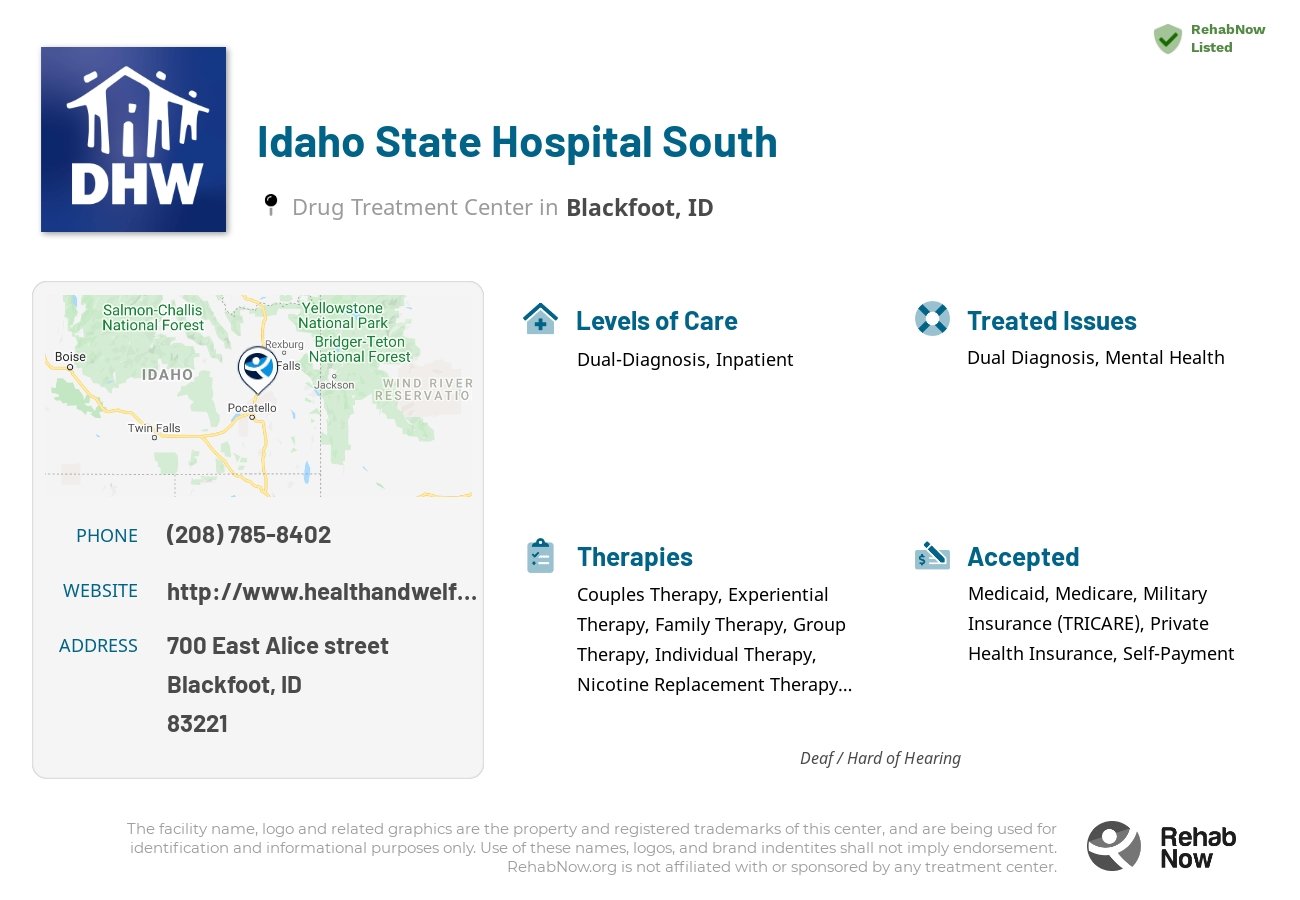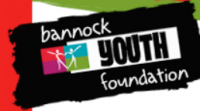Idaho State Hospital South
Drug Rehab Center in Blackfoot, Idaho
Idaho State Hospital South provides mental health and dual-diagnosis care in Blackfoot, ID, specializing in evidence-based treatments for mental health disorders and substance use disorders while accepting private health insurance and being affiliated with the Idaho Department of Health and Welfare.
About This Idaho Facility
Idaho State Hospital South, nestled in Blackfoot, Idaho, is a beacon for individuals grappling with the intertwined challenges of mental health issues and substance abuse. This public rehabilitation facility stands out for its specialized focus on dual diagnosis. It's an integral part of Idaho's broader effort to address complex health, social, and economic challenges.
With a solid backing of certifications from SAMHSA and a state license, Idaho State Hospital South upholds high standards of care. By accepting private health insurance, they ensure a wider demographic can access their inpatient services, crucial for those battling dual diagnosis. Their commitment to utilizing evidence-based practices and therapeutic approaches offers a structured pathway to recovery.
- Specializes in dual diagnosis treatment, providing targeted care for individuals with concurrent mental health issues and substance abuse problems.
- As part of Idaho's comprehensive health strategy, it ensures access to vital inpatient care for those in critical need.
- Employs evidence-based practices and a variety of therapeutic modalities to address underlying issues and promote long-term sobriety.
Idaho State Hospital South offers a sanctuary for individuals seeking relief from the grip of addiction, whether it be alcohol, drugs, or other substances, all the while addressing accompanying mental health conditions. The facility leverages a mix of individual counseling, group therapy, and educational sessions to foster recovery and resilience.
Genders
Ages
Modality
Additional
Conditions and Issues Treated
There are different kinds of Dual Diagnosis:. A person who simultaneously experiences both a mental illness and an addiction disorder. Or, a person who experiences one or more coexisting (simultaneous) mental health conditions in addition to a primary substance use disorder.
The treatment requires a multi-disciplinary approach, it’s crucial for individuals to partner up with a healthcare provider who understands all the recovery components.
Levels of Care Offered at Idaho State Hospital South
This center offers a variety of custom treatment tailored to individual recovery. Currently available are Dual-Diagnosis, Inpatient, with additional therapies available as listed below.
Inpatient treatment is the most intensive level of care, and it’s necessary for those who aren’t able to control their addiction. These patients also must be drug-free before attending inpatient programs .
During inpatient treatment, addicts live at an inpatient facility 24 hours a day while receiving help. This type of program is generally recommended for those who need to go through detoxification or who are struggling with serious addiction-related issues.
Therapies & Programs
People in addiction recovery can benefit from individual therapy. This type of therapy involves meeting with a therapist one-on-one. This allows for a personal and trusting relationship to be built so that the patient can be truly themselves and express any emotions they feel. Individual therapy leads to greater understanding and peace about your triggers for addiction and coping strategies to prevent relapse.
Couples therapy for drug addiction is based on the belief that addiction is a family disease. Everyone involved with an addict, not just the addict themselves, is affected by their behavior and the changes the addict goes through. The relationship also changes the addict’s significant other and has likely picked up some codependent behaviors. Codependency is a term used to describe a person obsessed with another person and their needs and feelings while neglecting their own. Addicts are usually people-pleasers, so it is understandable how one can become codependent in relationships with addicts.
Family therapy is a type of group problem-solving that aims to improve communication and relationships between the patient, their family, and sometimes friends. The main goal of family therapy for drug addiction is to create an environment where communication can occur without judgment, hostility, or blame. The therapist is with the family as they learn to communicate with each other differently, especially with the addict when s/he is using.
Group therapy sessions are held in rehab facilities, clinics, churches or community centers that offer drug addiction treatment. People who attend these groups are encouraged to voice their feelings and support other addicts in recovery. This helps group members strengthen their own recovery program while cheering on others who are struggling with sobriety.
Group therapy sessions provide recovering addicts with a chance to cope with everyday situations that many face. Group therapy sessions are held in rehab facilities, clinics, churches or community centers that offer drug addiction treatment.
People who attend these groups are encouraged to voice their feelings and support other addicts in recovery. This helps group members strengthen their own recovery program while cheering on others who are struggling with sobriety.
If you’re looking for addiction treatment, it’s important to find a facility that offers trauma therapy. This type of therapy helps people process and understand the past traumas that have led to their addiction. Trauma therapists will work with clients to help them understand their past and present relationships and show them that they are worthy of love. This therapy is typically done using visualization, discussion, and writing down thoughts and feelings.
Trauma Therapy is a form of therapy that involves working with a patient to help them process and understand the past trauma(s) in their life. This therapy is typically done using techniques such as visualization, discussion, and writing down thoughts and feelings. The main goals of trauma therapy is to help clients express their emotions and talk about what they are feeling.
Cognitive Behavioral Therapy (CBT) helps addicts identify faulty, negative thinking so that they can work together with the therapist to find healthier ways of thinking. CBT focuses on specific aspects of each person’s thinking, feeling, physiology, and behavior. It aims to identify specific problems in these areas, and create a personalized treatment strategy.
Addicts often experience intense cravings for sugary foods during recovery. By teaching addicts how to eat well and stay healthy, therapists can help them manage their cravings over the course of treatment.
During these sessions, Blackfoot, Idaho dietitians and therapists will offer advice about healthy eating options and teach addicts how to make specific changes in their diet that can help reduce the effects of cravings during recovery.This type of therapy is often used in conjunction with other types of addiction treatment services. By identifying specific triggers and developing strategies to help addicts avoid relapse, most individuals can overcome their cravings and stay sober for good after they finish rehab.
The first step to becoming a non-smoker is the choice to quit smoking. Nicotine replacement therapies are effective because they provide you with the nicotine you are addicted to without inhaling carcinogens from cigarettes.
There are several types of NRT. These include:
- Nicotine gum
- Nicotine patches (transdermal systems)
- Nasal spray
- Lozenges
The benefits to using NRT can include:
- Reduce the risk of heart disease and cancer
- Reduce the anxiety and irritability associated with quitting smoking
- Reduce the risk of type II diabetes.
- Improved fertility in women
Patient Experience
Experiential Therapy at Idaho State Hospital South
Experiential Therapy allows addicts to release emotions in a safe environment. The process involves addicts painting their feelings and releasing them on a canvas. LPE – Love, Peace, and Equilibrium is one of the most popular forms of experiential therapy.
Payment Options Accepted
For specific insurance or payment methods please contact us.
Is your insurance accepted?
Ask an expert, call (888) 674-0062
Idaho Department of Health and Welfare Associated Centers
Discover treatment facilities under the same provider.
Learn More About Idaho Department of Health and Welfare Centers
Additional Details
Specifics, location, and helpful extra information.
Blackfoot, Idaho 83221 Phone Number(208) 785-8402 Meta DetailsUpdated April 15, 2024
Staff Verified
Patient Reviews
There are no reviews yet. Be the first one to write one.
Blackfoot, Idaho Addiction Information
In 2010, Idaho ranked amongst the top ten states of substance abuse in several categories. Alcohol dependence and abuse pose a major problem throughout the state, especially among minors between the ages of 12 and 17 years old. Opioids, like everywhere else in the nation, are also responsible for many substance abuse problems in the Gem State.
The drug addiction problem in Blackfoot, Idaho, is not as bad as it is in some other parts of the country, but it is still a major concern. 8% of the population in Blackfoot struggles with addiction to drugs or alcohol. This can seriously impact individuals, families, and the community. Some of the most common treatment options include inpatient rehab, outpatient rehab, and 12-step programs.
Treatment in Nearby Cities
- Cambridge, ID (236.6 mi.)
- Challis, ID (131.3 mi.)
- Rupert, ID (78.5 mi.)
- Coeur d'Alene, ID (377.8 mi.)
- Post Falls, ID (385.0 mi.)
Centers near Idaho State Hospital South
The facility name, logo and brand are the property and registered trademarks of Idaho State Hospital South, and are being used for identification and informational purposes only. Use of these names, logos and brands shall not imply endorsement. RehabNow.org is not affiliated with or sponsored by Idaho State Hospital South.





